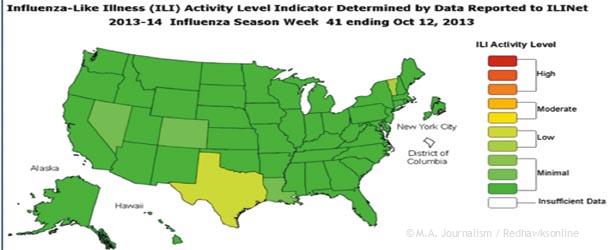Researchers attempt to produce a “Universal” flu vaccine. The research which began in 2009 has built a strong foundation and brings hope.
“I had the Swine flu in eighth grade while I was at Trout Lake Camp”, said senior Sarah Wilde. “It began as a cold, then became severe. I had high fevers, a lot of coughing, and I was very tired.”
For Wilde it wasn’t bad enough for her to get hospitalized but she still ended up missing three to four days of school.
The flu has been prevalent throughout time, seen as early as World War I, plaguing and killing whoever, or whatever, is in its path. Its ability to change each season enables it to attack annually with greater strength. Just recently it was found that people who have more CD8 T cells were able to avoid “severe” illness. These cells are virus immune cells. With this discovery the journey to create an effective universal flu vaccine was on its way.
Creating a universal flu vaccine
Within blood there are red and white blood cells. The red blood cells enable the circulation of oxygen and the white blood cells fight against “foreign” objects in the blood stream that could cause infection or illness. T cells are a type of white blood cell that aid in immunity.
The red blood cells are like a queen ant within an ant colony. The queen keeps order and creates the rest of the colony. The white blood cells are the drones. These drones need the queen in order to have a purpose and to stay alive. Within the large group of drones there are soldier ants. These soldier ants protect the queen ant at all costs, even going as far as attacking other ant colonies. These soldier ants can represent the CD8 T cell.
Researchers at Imperial College London, England found that the CD8 T cells directly target the core of the flu virus. Study leader and professor Ajit Lalvani told Science Daily, “New strains of flu are continuously emerging, some of which are deadly, and so the Holy Grail is to create a universal vaccine that would be effective against all strains of flu.”
Taking blood samples and nasal swabs as well as numerous surveys, from relatively healthy adults, in a case study that began from the H1N1 flu season in 2009 the Imperial London researchers’ correlation (between flu symptoms and the CD8 T cell) was a crucial one. If the CD8 T cells attacked the core of any flu virus that meant the ever-changing flu virus proteins would no longer be able to survive.
“The body is amazingly resilient,” said nurse Heidi Streed,”… And the body will fix itself or fight [illnesses]…but medicine is fabulous.”
Excited to research on her own Streed took the time to learn more about the universal flu vaccine.
“A study like this takes a lot of time,” she said.
Analyzing the information before her, she raised a very important point: the study was done in London.
There are generally two groups of people who are more susceptible to getting the flu those who are immuno compromised and those within the description of a young child or an older adult. According to Streed in order for the United States to take advantage of this study we need to perform our own study: moving through healthy people (phase one) then moving to those who have some illness (phase two) proceeding to a target audience and lastly to the Food and Drug Administration.
Producing more CD8 T cells
Through the research of Lalvani and his team the conclusion was made: the human body needs to create more of these CD8 T cells.
Minnehaha Academy alum (’80) and director of the Infectious Disease Epidemiology, Prevention, and Control Division at the Minnesota Department of Health Kristen Ehresmann wrote in an email “Having a vaccine that targets the stalk [the core of the flu virus] of the which is more ‘conserved’ would mean better protection and needing to get vaccinated less often…we need to look at vaccines that will stimulate Cd8 T cells based on the findings of this research [from The University of Minnesota report The Compelling Need For Game-Changing Influenza Vaccines as well as the research in London].
Concerning the question raised by Streed, Ehresmann believes it would be hard to do the same research in the United States.
“I don’t think we have the necessary ‘political will’ at this point to accomplish what needs to be done to really achieve the goal of a universal vaccine. Until there is demand for a better vaccine, manufacturers are unlikely to put the money into developing such a vaccine.”
Senior Elleni Oberle has received the flu shot every year and plans on getting it this year as well.
“It [the flu shot] used to be required when I was younger but now my mom encourages it,” said Oberle. “Even though it’s not required I want to get it. It not only protects me, but it’s good for everyone around me.”
For Oberle the flu shot has been an essential part of her health. Oberle urges people to take the flu seriously, she believes that the constant reminders, posters, and forms of advertisement may be deterring people from caring as much as they should about the flu.
“It’s [the flu] such a big deal that it becomes blown up and then people tend to look over it,” said Oberle.
An example of this may be quizzes in a classroom. The quizzes may seem inconsequential, frequent and annoying at first, but when the student gives less effort, in this area, the points are slowly lost and by midterms or finals the grade is not as high as it could have been.
Whether the production of these CD8 T cells is a possibility or not, the research that has sparked the conversation is one that has proven that science has made a difference in our lives and could possibly again.

